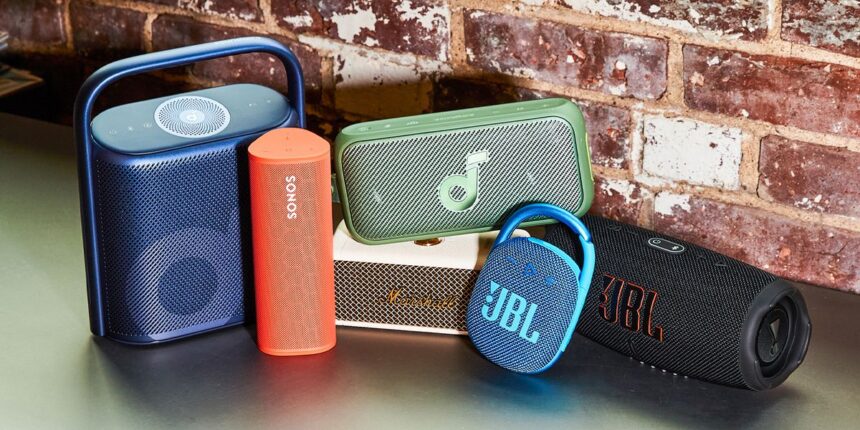The world of audio is evolving, and two popular speaker types—wireless and Bluetooth speakers—offer versatile, high-quality listening experiences. These technologies are not the same, even though they are sometimes used interchangeably. Wireless speakers typically use Wi-Fi networks, offering superior sound quality and smart features like multi-room audio. Bluetooth speakers, on the other hand, are more portable, pairing seamlessly with devices for on-the-go listening. Understanding these differences is crucial for selecting the right speaker type that fits your lifestyle, whether you need stationary, high-fidelity home audio, or portable sound for outdoor adventures. Explore both to discover your ideal music companion.
What Are Wireless Speakers?
Wireless speakers offer the convenience of audio playback without the need for cables to connect them to a device. Instead of traditional analog or digital wired connections like RCA or USB, they use wireless transmission protocols like Wi-Fi or radio frequency to receive audio signals. Here’s a quick summary of their key features:
1. Connectivity:
Wireless speakers connect through various protocols such as Wi-Fi, RF (radio frequency), or infrared. Their connection relies on existing networks, providing a greater range than Bluetooth speakers and often supporting multiple devices simultaneously.
Check out the Portable bluetooth speakers
2. Audio Quality:
Due to their reliance on high-bandwidth networks like Wi-Fi, wireless speakers can deliver higher audio quality, often with better fidelity. They are less susceptible to audio compression than Bluetooth, providing a richer sound experience.
3. Features:
Many wireless speakers come with smart features, like multi-room audio, that allow you to play different songs in different rooms or synchronize them to create a seamless experience throughout your house.
4. Usage:
Because they rely on Wi-Fi networks, wireless speakers are better suited for stationary home use. Some models are portable but require a Wi-Fi network connection to operate.
What Are Bluetooth Speakers?
Bluetooth speakers are a type of wireless speaker that uses Bluetooth technology to receive audio signals. They are often more portable and can quickly pair with a wide range of devices. Here are their distinguishing features:
1. Connectivity:
these speakers connect directly to devices like smartphones, tablets, and laptops via Bluetooth, a short-range wireless protocol. This enables pairing with devices easily and securely without needing a separate network.
2. Audio Quality:
these speakers can be prone to audio compression due to bandwidth limitations, particularly when dealing with older Bluetooth versions. Newer Bluetooth standards have improved audio quality significantly, providing near-CD quality for casual listening.
3. Features:
theses speakers prioritize portability and convenience. Their compact size makes them highly portable, and many come with rechargeable batteries, making them ideal for use on the go.
4. Usage:
With their ability to pair with any Bluetooth-enabled device and battery power, Bluetooth speakers can be used in various settings like outdoors, in cars, or on road trips.
Key Differences Between Best Wireless and Bluetooth Speakers
After understanding how each type works, here are the primary differences between the two:
1. Connectivity Range:
Wireless speakers, particularly those that use Wi-Fi, have a far greater range than Bluetooth speakers. Bluetooth connections are typically limited to a range of 30 feet or less, while Wi-Fi can extend throughout an entire home.
2. Audio Quality:
Wireless speakers, using high-bandwidth Wi-Fi networks, deliver higher audio quality than Bluetooth speakers, which often compress audio signals to accommodate lower bandwidth.
3. Portability:
Bluetooth speakers are generally much more portable than wireless speakers. Their compact design and rechargeable batteries make them ideal for on-the-go use.
4. Compatibility:
Wireless speakers require a Wi-Fi network and typically need a dedicated app for control, while Bluetooth speakers can pair directly with any Bluetooth-enabled device.
5. Multi-Room Support:
Wireless speakers often have features like multi-room audio, which allows different speakers to be controlled as part of a larger network. Bluetooth speakers, on the other hand, typically pair with a single device.
6. Power Source:
Most Bluetooth speakers use batteries that make them portable, whereas many wireless speakers are designed to be plugged into a power outlet due to their higher power requirements.
Which One Should You Choose?
Choosing between Bluetooth and wireless speakers depends on your specific needs and preferences. Here are some points to consider:
1. Portability:
If you want a portable speaker that you can easily carry outdoors or on trips, Bluetooth speakers are the better option.
2. Sound Quality:
Wireless speakers using Wi-Fi will typically offer superior audio quality due to higher bandwidth, making them a better choice if high-fidelity sound is a priority.
3. Budget:
Bluetooth speakers are available in a wide price range, from budget-friendly to high-end. Wireless speakers, due to their sophisticated features, often come at a higher cost.
4. Connectivity Preferences:
Consider how you will use the speakers. Bluetooth speakers are great for direct pairing with mobile devices, while wireless speakers are perfect for home audio systems with features like multi-room audio.
Understanding Advanced Features
Both wireless and Bluetooth speakers have evolved significantly, offering a wide range of advanced features to enhance the listening experience. Let’s delve deeper into these features to help you understand which speaker type is best suited for your needs.
1. Smart Assistance Integration:
Many wireless speakers, particularly those operating over Wi-Fi, often come equipped with smart assistant capabilities like Amazon Alexa, Google Assistant, or Apple’s Siri. This Smart Assistance speakers allows users to control the speaker with voice commands, access music streaming services, and even manage smart home devices. Bluetooth speakers generally lack such features due to their simpler technology, although some newer models can still interact with virtual assistants when connected to a smartphone.
2. Pairing and Stereo Sound:
Bluetooth speakers have started incorporating stereo pairing, allowing users to connect two or more speakers together to form a broader soundstage. However, this feature is limited compared to the multi-room audio systems of Wi-Fi speakers, which provide more flexibility in arranging speakers throughout the home. Wi-Fi systems allow you to group speakers together or play different tracks in separate rooms, creating a versatile, immersive listening experience.
3. Battery Life and Charging Options:
Bluetooth speakers are designed to be portable, meaning they often come with built-in rechargeable batteries. The battery life varies by model, ranging from a few hours to over 24 hours of playback time. On the other hand, wireless speakers designed for home use usually rely on constant power from an electrical outlet, as they are not intended to be moved frequently. Some portable wireless models combine the convenience of batteries with Wi-Fi connectivity, providing a hybrid solution for those who need both portability and high-quality audio.
4. Durability and Water Resistance:
For people who frequently listen to music outdoors, Bluetooth speakers often provide rugged, water-resistant designs, making them suitable for beach trips, hikes, or poolside parties. Many feature IP ratings, indicating their resistance to water splashes or dust. Wireless speakers, primarily used indoors, tend to have a more delicate design and are often not equipped with water-resistant features.
Practical Applications and Scenarios
To help illustrate the benefits of both wireless and Bluetooth speakers, consider the following real-world scenarios:
1. Hosting a Party:
If you’re hosting a party at home, wireless speakers connected via Wi-Fi are ideal. Their superior audio quality and multi-room features enable you to fill the entire house with consistent, synchronized music. You can play different playlists in separate rooms, allowing guests to enjoy different styles based on their preferences.
2. Camping or Hiking:
For outdoor adventures like camping or hiking, Bluetooth speakers are the way to go. They are small, durable, and have long battery life, enabling you to enjoy music throughout the day without worrying about power outlets.
3. Everyday Home Use:
When listening to music or podcasts while doing daily chores around the house, Bluetooth speakers can be convenient due to their quick pairing with smartphones or tablets. But if you’re after a richer audio experience while cooking, relaxing, or studying, wireless speakers can provide superior sound quality and flexibility.
4. In-Car Entertainment:
Bluetooth speakers can also be a good option for older vehicles that lack built-in Bluetooth functionality, offering an easy way to stream music from your phone without replacing the car’s entire audio system.
Final Thoughts
Whether you opt for Bluetooth or wireless speakers, the key lies in understanding your priorities. Bluetooth speakers are designed with portability in mind, offering seamless pairing, reasonable audio quality, and durable designs for on-the-go listening. Wireless speakers, on the other hand, cater to those who seek high-fidelity audio and advanced smart features, particularly in a stationary home setting.
With both wireless and Bluetooth speakers available in various price ranges and feature sets, there’s something out there to match everyone’s preferences. Armed with the insights from this guide, you’re well-prepared to make an informed decision on which speaker type will provide the best listening experience tailored to your unique needs.
Conclusion
Wireless and Bluetooth speaker both have their own set of advantages. Bluetooth speaker excel in portability and ease of pairing, making them perfect for people who need music on the go. Meanwhile, wireless speakers deliver superior audio quality and smart features, suitable for dedicated audio setups at home.
In the end, your choice will depend on whether you prioritize portability or quality. Hopefully, this guide has helped clarify the differences between Bluetooth and wireless speakers so you can make an informed decision for your next audio purchase.
Also Read: Embrace the Future with PS5 gaming console | Qualcomm’s PC Invasion: Redefining Computing Power










